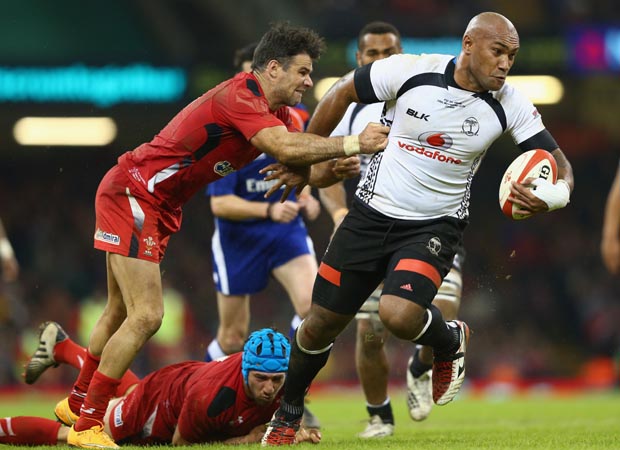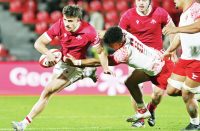 When it came to inflicting recent damage on Wales, nobody had done so to more devastating effect than Akapusi Qera and his friends from the South Pacific.
When it came to inflicting recent damage on Wales, nobody had done so to more devastating effect than Akapusi Qera and his friends from the South Pacific.
Fiji’s two previous run-ins with the triple Grand Slammers on European soil wrought enough destruction to leave some notable victims out in the cold and, in one case, out of work.
The World Cup schemozzle in France seven years ago resulted in Gareth Jenkins being sacked as head coach with such indecent haste that they gave him his cards in the car park of the team hotel on the Sunday morning.
A few players went with him, never to be seen on the big arena again. When Fiji reappeared at Cardiff three years later, more mayhem ensued with Ryan Jones the principal casualty on that occasion.
Giving away the penalty which allowed the Fijians to inflict further misery in the form of a 16-all draw was enough for Warren Gatland to sack Jones from the captaincy and discard him completely from his squad against the All Blacks the following week.
Put in that context, Qera’s solemn pre-match declaration that Fiji had “the players and the system to beat Wales” raised the anxiety factor swirling around the Millennium
Stadium as a congregation 60,000-strong filed in, their faith shaken but unbroken despite Australia‘s tenth straight win the previous week.
The towering presence of Nemani Nadolo, a centre colossal enough to make George North seem almost lightweight in contrast, did nothing to ease public apprehension. As if that wasn’t enough, the South Sea Islanders came equipped with a prop, Campese Ma’afu, named after Australia’s magical wing.
Early tries for George North on one wing and Alex Cuthbert on the other, each finished off without either player breaking sweat, pointed to a reassuring romp before the All Black commandos take the place by storm next Saturday.
Surprisingly, the three central Fijian characters – their captain, their midfield colossus and their bearded prop – then gave Wales the most generous of helping hands with a series of blunders.
Eight minutes before half-time, with Wales uncomfortable at 10-6, Qera stampeded through a defence stripped so bare that he had four team-mates outside him without a red shirt anywhere near them. Instead of making the most of the monstrous overlap with the simplest of passes, Qera cut back inside into the flimsy Welsh cover.
Nadolo, the 20-stone goliath, then proceeded to miss successive penalties almost as if he appeared to be too big for his size 13 boots. That meant another six points down the drain in addition to the minimum of five squandered by his captain.
The cumulative effect of the disappearing scores had barely registered on the rest of the team than they stumbled into another self-inflicted blow. This time the disappearance centred around their loosehead prop, the aforesaid Ma’afu.
Binned for conceding one of the four penalties which brought Wales their due reward of a seven-pointer under the posts, he returned only to earn himself a second yellow for toppling an airborne Bradley Davies.
Campese’s encampment on the naughty chair forced Fiji to endure the last half hour with 14 men. That they not only endured but scored the only points during that time is a damning indictment of Wales.
Pitifully few rose above the demoralising mediocrity around them. Liam Williams led the way and if a bow-leg gives the impression of a player being born in the saddle like a latter-day Clint Eastwood, there is no doubting the high-octane ability of the Scarlets‘ ex-scaffolder.
Williams is as good as he is brave which is saying something, so good that Wales now have a serious full-back alternative to the almost indispensable Leigh Halfpenny. His electrifying presence can be measured by the fact that he made a total of 224 metres, almost three times further than anyone else.
Elsewhere, Ospreys hooker Scott Baldwin made the most of a timely opportunity to stake a claim against the All Blacks and when Wales did threaten to run amok early on, Justin Tipuric scarcely missed a trick.
Wales, lacking the nous to keep the match tight and exploit the supremacy of their pack to drive a wedge through the Fijians, talked all week about the importance of a structured game and then allowed themselves to be suckered into the opposite.
Incredibly, they conceded eight turn-overs in the first half without forcing a single one of their own. “That killed us,” acting captain Gethin Jenkins said. “We couldn’t put any more than three or four phases together.”
When Wales did cross the line, they were denied by the TMO, Carlo Damasco. The Italian ruled that Dan Lydiate had grounded the ball short of the line, then took an eternity to disallow Taulupe Faletau’s later touchdown and penalise Liam Williams despite his not being held in the tackle.
The time involved merely detracted from the entertainment value, not that there was much of it to be had. Perhaps not surprisingly, Wales did have one bit of creativity up their sleeve, inviting Nadolo to gallop off on the intercept try which made for an uncomfortable last 80 seconds or so.
As Test match non-events go, this will take some beating, not that it was quite as awful as the Welsh defeat by Samoa in the same stadium two years ago. No wonder Gatland used the word ‘frustration’ five times in as many minutes while his opposite number, John McKee, used it twice.























